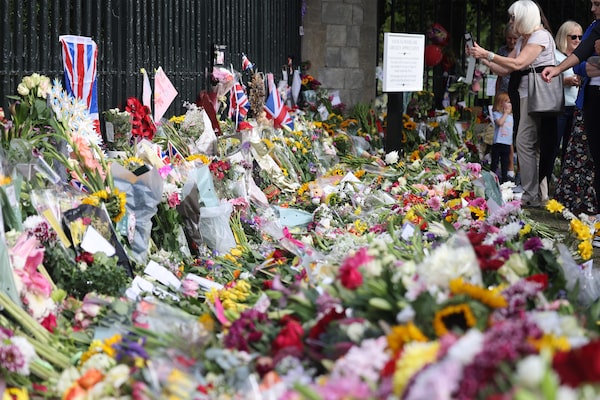
Flowers and tributes at The Long Walk gates in front of Windsor Castle, in Windsor, England, on Sept. 12.Neil P. Mockford/Getty Images
Tom Rachman is a contributing columnist for The Globe and Mail.
Why are many Britons – by repute, an unflappable people – so shaken by the death of the Queen?
After all, her demise at age 96 cannot be called startling. Yet “a shock” is how more than a few have described her passing. It isn’t just monarchists either, but palace-problematizing socialists and dispassionate intellectuals – even expats who had presumed their links to the old country weren’t much more than the lingering accent and a taste for Marmite.
While sorrow over another’s death is simply humane, this response seems more personal, and more anxious, than can be easily justified. “Bewildering days” is what the BBC called these, speaking of “an unsettled kingdom” without her guidance.
However, vast powers haven’t just fallen into the wrong hands – no British monarch wields such control; each just ratifies what the government asks.
Nor could you equate this to the anguish over Princess Diana’s premature death in 1997. The Queen enjoyed a steady tenure, reigning for almost twice as long as Diana’s entire lifespan. She saw the world many times over, was feted in continuation, lucky in marriage, with a doting family and a meaningful role till her final day, when she slipped peacefully away at one of her holiday castles. This was no tragedy.
A much-cited explanation for British distress is that the Queen held the country together, so national cohesion is now imperilled. “With her gone, the risk of becoming unstuck and falling apart on so many fronts is all the greater,” one prominent commentator worried.
This doesn’t hold up. It’s true that the United Kingdom is a mess, with soaring prices and bitter post-Brexit politics, a risk of secession in Scotland and hostilities in Northern Ireland, plus millions across the British Isles trembling before a winter of discontent.
But if the Queen were “the rock” sustaining a national edifice – if she were such a cohesive force – how to explain the disunited kingdom that emerged during her reign?
An alternate explanation for post-Elizabeth worry is that Britain’s wretched state cannot sustain further instability, with a fresh monarch ascending just two days after the appointment of a fresh prime minister.
That argument doesn’t hold up either. While King Charles is new on the job, he trained for 70 years – hardly a newbie unfamiliar with ribbon-cutting and royal protocol. As for Liz Truss, she assumed her role with considerable experience too, having held ministerial jobs for the past decade. If anything, the new Prime Minister – known for Brexiteer fantasizing and shameless self-promotion – represents continuity with her predecessor, Boris Johnson.
A better clue to British dismay emerges from how mourners speak of the Queen: It’s so personal. “She was there all my life, and long before, and a reassuring presence, reliably and consistently bland,” a born-Londoner, now based abroad, told me. “The Queen was a link with a different Britain which has now vanished, but which was part of my past as well.”
Here we approach an explanation: Queen Elizabeth was a manifestation of their common story, of antiquated ways, dissolving slowly from view – then, one day, just gone. She presided when you stuck her stamp on intimate letters (but who corresponds with envelopes anymore?). Her metallic profile clinked in your palm when you’d collected enough for a treat from the shop (though you buy groceries with a plastic rectangle now).
The Queen was a documentary reel of the postwar period, its hope and pridefulness, much that shone and won’t shine again. She cupped a glittering orb as the British Empire shrank off the map and held a sceptre that was never a magic wand. She evokes parents and grandparents no longer present, there neither to overlook nor rely on any more.
Even when your past contains more than just triumph, when it’s pocked with failings too – even then, the fade to black hurts. It’s among the pains of living, a payment made to time: that each year, there’s more you’ll never touch again.
This is why many Britons mourn her so personally and with such unease. The Queen herself did little to offend. She just existed, a soft-focus icon of Britishness as Britain lost clarity on what Britishness meant.
During the hours and hours of radio and TV coverage here – much trying to explain itself, to justify why this mattered – citizens praised the late monarch in terms that matched what has shrivelled away in British public life: A respect for rules; duty without fuss; no urgency to opine on everything.
Britain worries about life without her because Britain without her was already here – and few like the looks of it.
Keep your Opinions sharp and informed. Get the Opinion newsletter. Sign up today.